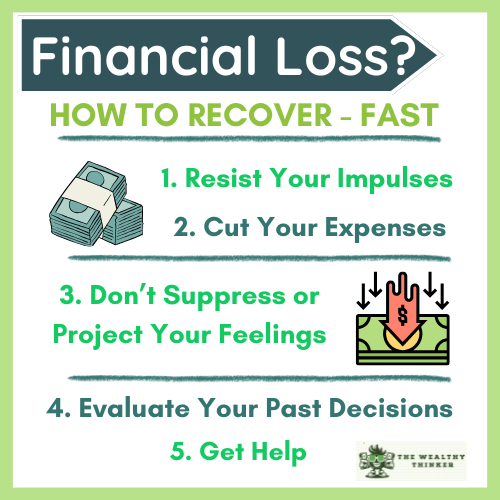You’ve been doing everything right – budgeting, saving, investing, living within your means.
You’re financially disciplined and committed. And then, out of nowhere, something big knocks the wind out of your money goals.
Sound familiar?
Unfortunately, even the most responsible people can face major financial loss.
You could be killing it with your budget for years, and still, one unexpected blow – like losing your job or getting hit with surprise medical bills – can throw everything off track.
While having an emergency fund is always a smart move (if you don’t have one, make it a priority), the truth is:
👉 Some financial disasters can’t be predicted – or prevented.
This isn’t about planning ahead. This is about reacting to a hit you didn’t see coming – and doing it under pressure.
What You’ll Learn in This Article:
- The most common causes of major financial loss
- Six practical ways to cope and recover
- How to mentally reset after everything changes
What Causes Financial Loss?
Let’s get real. Most people don’t go broke from buying too many lattes. Major financial setbacks usually come from much bigger, harder-to-control events.
Here are the top five culprits behind personal financial disasters:
- Losing your job
- Medical emergencies or ongoing health costs
- Divorce or separation
- Debt that spirals out of control
- Unexpected events that insurance doesn’t fully cover
These things don’t just happen to people who are careless with money – they can happen to everyone.
Take job loss, for example. Imagine getting laid off while you’re still paying off student loans or carrying credit card debt. That one change can snowball fast.
Or consider natural disasters. Even with “hurricane insurance,” if you don’t have flood coverage, you could still be on the hook for tens of thousands of dollars.
Being underinsured can wipe out your savings overnight.
Here’s the Hard Truth:
You can be doing all the “right” things – paying off your mortgage, showing up at work, cutting back on spending – and still find yourself in a financial crisis.
And honestly? Expecting anyone to be fully protected from all of these risks for their entire life is asking a lot. Sometimes it’s just bad timing or bad luck.
But even if you can’t control the setback, you can control how you respond to it. And that’s what we’ll help you with next.

How to Recover From a Big Financial Loss
So, if a big financial loss does occur, there are a few things you will want to do. The first is to stay calm.
1. Don’t Allow Impulses to Take Over
Under any form of extreme stress, a fight or flight response is an automatic, strong, emotional, and acute reaction. But it’s also a well-understood psychological response and one that you should not allow to influence your financial decisions.
This may seem like a strange and condescending place to start. But it’s critical to be aware of how your brain naturally responds to stress and not allow it to be overly influential.
Fight or flight impulses may be helpful in surviving the many threats of the wilderness, but you won’t want to react so quickly and instinctually when it comes to your money.
Examples like pulling out your retirement fund, selling your house, and withdrawing other investments should be delayed until you’ve run through all your options.
So first, take the time you need to calm down, then run through all the potential courses of action you have and make a logical choice.
2. Reduce Expenses
There is one quick response to financial loss that does make a lot of sense.
Eliminating unnecessary expenses and sticking to only spending what you really need will at least partially help you account for the new gap in your budget.
But while this is a common sense solution, make sure you’re thorough about it.
Here is a great article on reducing expenses and saving: How to Build a Debt Reduction Plan, Step by Step
3. Identify Poor Coping Strategies
Similar to our first point, you will want to understand all the negative forces that enter your mind under stress. This can include both inwardly and outwardly projected behaviors.
One of the most common responses to any kind of stress is suppression. Suppressing thoughts and feelings help you avoid confronting the unfortunate reality of your situation.
But that reality exists either way.
So, the key here is to recognize and accept the situation for what it is and talk to your family, friends, colleagues, or whoever can offer genuine support.
Likewise, projection is a common coping response.
Of course, it’s possible to place some level of blame on your boss if you recently lost your job. Or perhaps your family spent too much money before you entered your current situation.
But projecting the blame towards others is a response that mentally isolates you from your situation, making it as useless as suppression.
The key here, again, is:
- to accept the situation for what it is
- be truthful with yourself and others
- seek support where you can find it
There are other useless responses that can make you feel better but won’t solve the problem at hand. Denial is perhaps the worst, but other toxic responses yield similarly useless results.
So, shift your thinking to what you can do.
4. Evaluate Your Present and Your Recent Past
It’s possible that others contributed to your current financial hardship.
But instead of thinking about that, look at every level of influence you’ve had on your own actions.
Now is the time to find out how you got here. Not so you can shift blame or avoid handling your situation, but so you can avoid it in the future:
- Did you trust the wrong people with your finances?
- Did you take on debt irresponsibly?
- Did you not object to big financial commitments made by family members when you could have?
- Did you make risky investment decisions?
- Did you not diversify your investment portfolio to offset risk?
- Did you forgo an insurance policy that would have saved you from much of your current trouble?
- Did a slick salesperson get you to make an unwise decision?
- Were you too prideful to realize your job was on the line?
This list of questions can go on and on. While these are hard things to admit, they are necessary questions if you want to get some closure and pave a better future for yourself.
5. Get Help
Be as open as possible with those close to you and ask for help from those who are willing and able to help you.
Avoid toxic friends and family, and focus on handling your current problems.
Getting professional help is also an option. You can find free support meant for people in your position.
Non-profits like the National Foundation for Credit Counseling offer free budget and credit reviews, counseling for financial health, and negotiation with creditors.
6. If Necessary, Take a Loan or Declare Bankruptcy
Sometimes there isn’t an easy way out of financial hardship.
In these cases, you should avoid declaring bankruptcy if you can.
An unsecured personal line of credit can be a good tool for staying afloat and paying for what you need, if you have a path to use it responsibly while you recover.
But when you’re in truly dire financial straights, sometimes declaring bankruptcy will be the only option.
In that case, make sure you understand the consequences and get the counseling you need to complete the process.
It will be a long road to financial recovery if you declare bankruptcy, but if it’s the only option (and you’ve thoroughly explored your other options), then it can be seen as the last resort.
What Are Hardship Loans and How Do They Work?
Conclusions: How to Mentally Recover After a Financial Loss
Financial troubles affect good people and bad people alike.
People slip from poverty to bankruptcy, and sometimes people who are financially well-off end up losing it all. But people do also bounce back, sometimes gloriously so.
The key is that as much as you may want to blame yourself or blame others, at some point blame becomes irrelevant.
People make mistakes, and financial mistakes are far from the worst or least understandable mistakes people make.
Again, we can’t overstress the importance of asking for help when you need it. This is especially true if you have a history of mental illness.
If you are struggling with mental health challenges while handling financial loss, use the resources you can. Talk with the caring people in your life who are willing to help. If you are clinically ill, you can also consider claiming bankruptcy due to mental illness.
Probate and bankruptcy courts offer some help to people suffering from mental illness who need bankruptcy protection.
Editor’s note: This article was originally published Dec 16, 2023 and has been updated to improve reader experience.




















You left out the 3rd reaction to negative stress: FREEZING.
This is often called OVERWHELM now. It is an physical and emotional process which can prevent thinking and caring about things for a while. When someone is in this state they can’t make decisions easily. Or they do on autopilot when a new action is required.